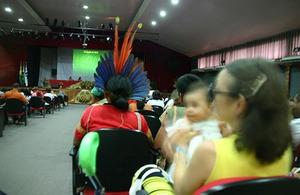DFID Research: Democratizing Brazil's Indigenous Health System
The health system attending to indigenous populations in Brazil is overhauled applying lessons learned from DFID-funded research

Workshop on indigenous health system reform in Brazil
With funding from the Department for International Development, researchers investigated why some of Brazil’s Health Councils - constitutionally mandated forums where ordinary citizens can help shape health policy and monitor service provision - are more inclusive and democratic than others. Now Brazil’s Health Ministry has hired some of those researchers to apply the lessons learnt from the research to a massive overhaul of the health system attending to indigenous populations.
After indigenous groups occupied a number of government buildings to protest at the often deplorable state of health care in their communities in late 2008, Brazilian President Luiz Inacio Lula da Silva ordered the Health Ministry to overhaul indigenous health services. Infant mortality among indigenous people in Brazil is more than twice that for the population as a whole, despite per capita spending over four times higher. The government agency known as Funasa, which is responsible for overseeing health care for indigenous groups, has been accused of mismanagement by indigenous leaders, and the Minister of Health himself has publicly recognised the existence of serious problems of corruption and poor-quality service provision.
Reforming the health system
The Ministry has now promised to bring in a series of reforms to the system. The design of these reforms, under a World Bank-supported programme called VIGISUS II, is being established in large part through a process led by researchers who have collaborated with the Development Research Centre on Citizenship, Participation and Accountability, a DFID-funded research network. Researchers from IDS have teamed up with Brazilian colleagues from the network (affiliated with the think-tank Cebrap and with SSL, a health rights NGO), and with researchers from the Future Health Systems Research Programme Consortium, which is also funded by DFID.
Together, these partners have run a series of regional workshops for indigenous representatives, health staff and managers, and to come up with proposals for reforming the system to strengthen its performance and guarantee accountability and transparency. This requires new approaches that combine changes to governance arrangements with innovations in the organisation, planning and management of the government-financed health services.
Health Councils need to be accountable
Lessons from the previous research on Health Councils in indigenous communities and in Sao Paulo will provide some guidance. After the Brazilian “Citizens’ Constitution” of 1988 established the right to participate in the governance of health, Health Councils have been established in nearly all of the country’s 5,000-plus municipalities. These councils are empowered by law to inspect public accounts and demand accountability, and some strongly influence how resources for health services are spent.
Such mechanisms are now seen as critical for ensuring the new health system attending to indigenous groups remains free of the negligence and abuse that has been rampant in the past. But there is no guarantee that participatory councils will deliver. The research has underscored that the ability of Health Councils to make health services pro-poor depends on how effectively marginalised and vulnerable people are represented, and whether their voices can provide a counterbalance to the interests of public health managers and local political elites.
Breaking the grip of powerful actors on the councils often depends on a public manager who is willing to champion the cause of participation, on strong civil society groups or other associations who refuse to let their constituencies be left out and on the rules and regulations that govern the election of councillors.
Still, with the right conditions in place, public participation can provide what one health manager termed ‘constructive co-existence’; citizens and their representatives are able to make demands on government for accountability, and government is able to engage citizens and civil society organisations in monitoring the functioning of the public health system and shaping effective public policies.